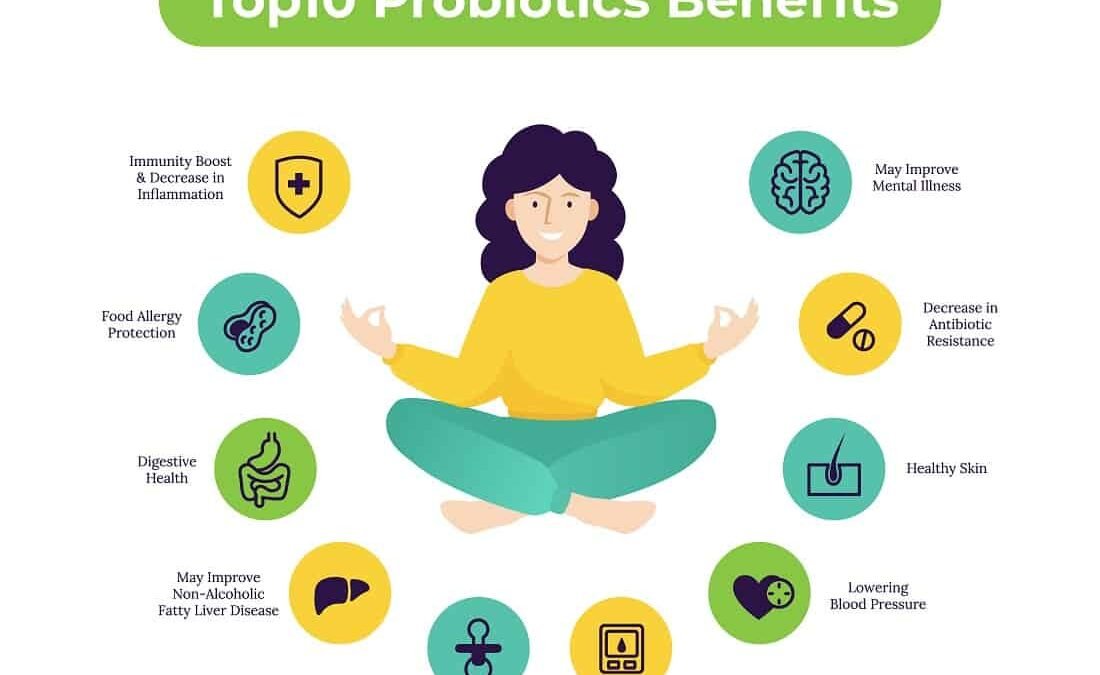When you fall sick, bad bacteria enter your body and surge in number very quickly. This gradually puts your body out of balance. Here, good bacteria come to the rescue by fighting the bad ones off, thereby restoring the balance. Some of the significant functions of probiotics are as follows:
- Creating vitamins.
- Breaking down and absorbing medicines.
- Keeping bad bacteria out of your body.
- Making the digestion of food easier.
Have you ever wondered that you can actually eat a certain type of friendly bacteria to improve your health? Also known as probiotics, these bacteria can be taken as supplements for colonizing your stomach with health-enhancing microorganisms. The most common groups of probiotic bacteria consist of Bifidobacterium and Lactobacillus. You can also consume food items, such as kimchi, tempeh, sauerkraut, kefir, and yoghurt to supply probiotics in your gut.
At present, researchers are unsure of the effects of probiotics to treat medical conditions. These supplements do not undergo stringent tests by the U.S. Food and Drug Administration (USFDA), unlike medications. Therefore, manufacturers can easily sell their products by simply claiming that they are highly effective and safe.
According to Fortune Business Insights™, the global probiotics market size was valued at USD 48.88 billion in 2019 and is projected to reach USD 94.48 billion by 2027, exhibiting a CAGR of 7.9% during the forecast period.
Can Probiotics Help in Fighting Depression?
A group of researchers at Brighton and Sussex Medical School carried out a metastudy between 2003 and 2019 which mentions that probiotics found in kimchi, sauerkraut, and yoghurt are capable of easing the symptoms of depression. Their results exhibited that between 2016 to 2017, around 1.4 million people in the United Kingdom were diagnosed with severe mental health issues and a third of them were affected by depression.
The group collected 71 studies and out of those, seven successfully met all the criteria. Then, they commenced the investigation of one probiotic strain, while four researchers started blending multiple strains to observe their effects. In every experiment, 12 strains belonging to the groups of Bifidobacterium bifidum, Lactobacillus casei, and Lactobacillus acidophilus were featured in the chosen studies.
New Study Reveals Method to Develop Personalized Gut Health
Bruce R. Hamaker, a professor of food science stated in a virtual webinar that specific prebiotic can be matched with a few types of probiotic strains. The webinar was a part of an event organized by the Institute of Food Technologists, Chicago in July 2020. Prof. Hamaker teaches at Purdue University located in West Lafayette. He further said that the development of personalized gut health is possible by following the prebiotic-probiotic findings. A microbiota or an in-vitro pretest analysis will be able to detect the fiber-based prebiotics for creating personalized health.
What Does the Future Hold?
The future uses of probiotics include a reduction in respiratory disease, immune stimulation, inflammatory disease control, cancer prevention, and the treatment of allergies. The current methodological and technological developments in this field would provide numerous possibilities for the applications and research of probiotics. Overall, multiple probiotic strains can greatly contribute to the betterment of global issues that are threatening the society.
Source of Information:
https://www.fortunebusinessinsights.com/industry-reports/probiotics-market-100083
Author’s Bio –
Name: Reeti Banerjee
Reeti Banerjee is currently working as a content writer in a prominent market research firm. She specializes in writing articles, press releases, blogs, and news reports. She believes in maintaining simplicity throughout her content to provide the clients with a seamless reading experience.
Related posts
Subscribe Now
* You will receive the latest news and updates on your favorite celebrities!
Meet the Author

Gillion is a multi-concept WordPress theme that lets you create blog, magazine, news, review websites. With clean and functional design and lots of useful features theme will deliver amazing user experience to your clients and readers.
Learn moreHOT TOPICS
Categories
- Animals (6)
- Business (579)
- Cooking (3)
- Design (17)
- Education (59)
- Entertainment (62)
- FASHION (89)
- Fashion (39)
- Featured (19)
- FOOD (42)
- Guide (55)
- Health (290)
- HOME (184)
- Interior (14)
- Life (8)
- Lifestyle (111)
- Motivation (6)
- News (47)
- People (4)
- Photography (5)
- Review (4)
- Style (4)
- TECH (176)
- Travel (107)
- Uncategorized (1,328)



Stay connected